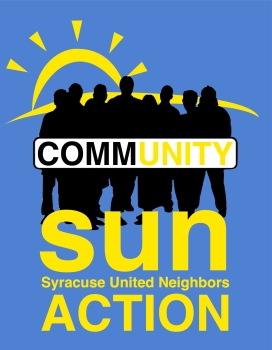Politicians use a couple of metaphors to explain tough economic times. One is, “city residents are a family and we’re all in this together.” The other is, “the city is going to be run like an efficient business.” In Syracuse, if you live in a low-income neighborhood, you have probably heard both metaphors. What hasn’t been said is the truth: “Dad blew the family’s savings on gambling and the business was managed like Enron.”
There is a housing crisis in Syracuse’s south and near-west side. These neighborhoods make up 15% of the city’s households yet include nearly half of the city’s 1100 vacant houses. Bank foreclosures are booming with over 300 since July 2001. A neighbor is lost here every three days. Ten percent of the houses have more than one property code violation, a rate twice that of any other city neighborhood. Less than one-third of neighborhood families own their home, compared to 40% in the city overall and 64% in the county.
The federal Department of Housing and Urban Development (HUD) provides the city of Syracuse roughly $9 million annually through the Community Development Block Grant program. Given this stipend, why are all the programs dealing with housing in Syracuse either woefully underfunded or nonexistent? Why is there a two-year waiting list for the only program in the city that helps families finance serious home repairs? Why is there no program to rehabilitate abandoned houses?
Why isn’t $9 million a year enough to deal with the housing crisis? The short answer is that 60% of the budget is spent on non-housing programs. Administrative costs, training budgets and particularly economic development loans eat up the money before it gets to our neighborhoods. The city borrows money against Section 108 loans (another HUD program) to make business loans. The city has to repay the loans to HUD if the businesses fail. In the past 11 years the city has built up a $22 million dollar debt to HUD, forcing the city to take $6.2 million out of its Community Development Block Grant budget to repay HUD.
What have these economic development loans accomplished? Not much. Former Mayor Roy Bernardi built a new building for a company that promised to make plastic toecaps for work boots (and then diversify into eyeball implants!). The company never manufactured a thing. The largest project was the decision to buy an old department store downtown and fix it up with all kinds of high-tech gizmos to lure NiMo’s customer service center as a tenant. When NiMo was bought up and downsized by National Grid, the call center went back to headquarters and the newly renovated building sits largely empty.
Syracuse United Neighbors (SUN) has been an outspoken critic of HUD 108 loans. We held a press onference on the steps of City Hall in 1992 to point out the danger of using money intended for low-income families as collateral for loans to fly-by-night businesses. Unfortunately, SUN has been proven correct. For the past decade, it has seemed like any white guy in a suit could come into City Hall with an outlandish business plan and walk out with millions of dollars. Meanwhile, families struggling to keep their homes in good repair, but who live in neighborhoods neglected by mainstream banks, have to wait two years to get a home improvement loan.
This past year, SUN convinced the city Common Council to build more oversight into future Section 108 loans. After passing a bill sponsored by Stephanie Miner, the Common Council now has final approval on all Section 108 loans. The shadowy and pseudo-governmental Syracuse Industrial Development Agency had approved all Section 108 loans prior to this bill’s passage.
The Section 108 loans we have now will continue to haunt us. Annual repayments of $2 million will be routine, with several years’ payments higher than that. While SUN members have met with HUD officials in Washington and gained a commitment to rewrite the terms of these loans, this is just a temporary fix. The city will end up paying more in interest by stretching out the duration of the loans.
Syracuse politicians looking to solve this problem should remember both of the aforementioned metaphors: run the city like a business by repaying your family the money you took out of the savings account. Budget the money for low-income housing now; everything else should come later.
